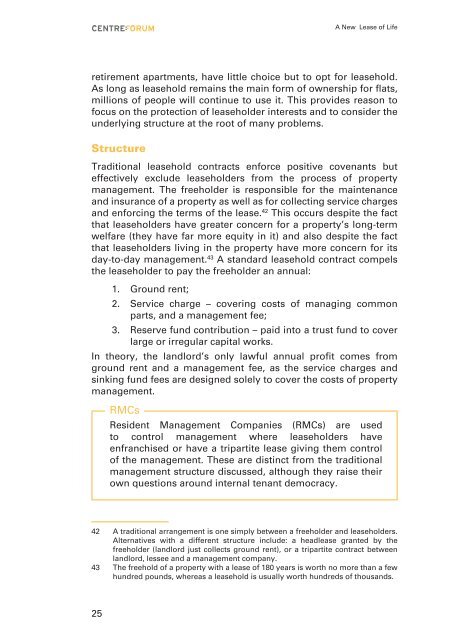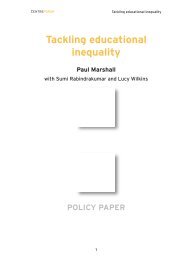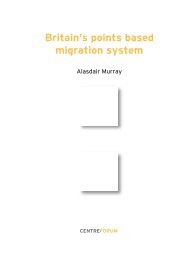A new lease of life: - CentreForum
A new lease of life: - CentreForum
A new lease of life: - CentreForum
Create successful ePaper yourself
Turn your PDF publications into a flip-book with our unique Google optimized e-Paper software.
A New Lease <strong>of</strong> Liferetirement apartments, have little choice but to opt for <strong>lease</strong>hold.As long as <strong>lease</strong>hold remains the main form <strong>of</strong> ownership for flats,millions <strong>of</strong> people will continue to use it. This provides reason t<strong>of</strong>ocus on the protection <strong>of</strong> <strong>lease</strong>holder interests and to consider theunderlying structure at the root <strong>of</strong> many problems.StructureTraditional <strong>lease</strong>hold contracts enforce positive covenants buteffectively exclude <strong>lease</strong>holders from the process <strong>of</strong> propertymanagement. The freeholder is responsible for the maintenanceand insurance <strong>of</strong> a property as well as for collecting service chargesand enforcing the terms <strong>of</strong> the <strong>lease</strong>. 42 This occurs despite the factthat <strong>lease</strong>holders have greater concern for a property’s long-termwelfare (they have far more equity in it) and also despite the factthat <strong>lease</strong>holders living in the property have more concern for itsday-to-day management. 43 A standard <strong>lease</strong>hold contract compelsthe <strong>lease</strong>holder to pay the freeholder an annual:1. Ground rent;2. Service charge – covering costs <strong>of</strong> managing commonparts, and a management fee;3. Reserve fund contribution – paid into a trust fund to coverlarge or irregular capital works.In theory, the landlord’s only lawful annual pr<strong>of</strong>it comes fromground rent and a management fee, as the service charges andsinking fund fees are designed solely to cover the costs <strong>of</strong> propertymanagement.RMCsResident Management Companies (RMCs) are usedto control management where <strong>lease</strong>holders haveenfranchised or have a tripartite <strong>lease</strong> giving them control<strong>of</strong> the management. These are distinct from the traditionalmanagement structure discussed, although they raise theirown questions around internal tenant democracy.42 A traditional arrangement is one simply between a freeholder and <strong>lease</strong>holders.Alternatives with a different structure include: a head<strong>lease</strong> granted by thefreeholder (landlord just collects ground rent), or a tripartite contract betweenlandlord, lessee and a management company.43 The freehold <strong>of</strong> a property with a <strong>lease</strong> <strong>of</strong> 180 years is worth no more than a fewhundred pounds, whereas a <strong>lease</strong>hold is usually worth hundreds <strong>of</strong> thousands.25





